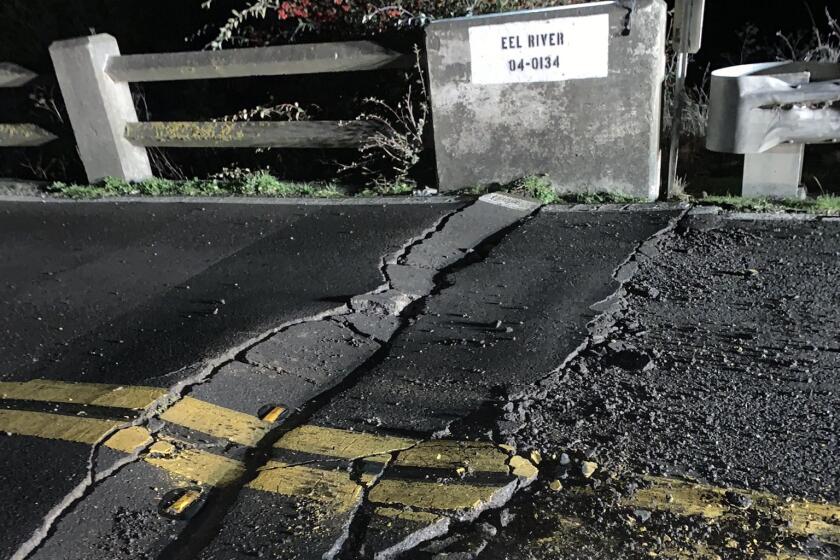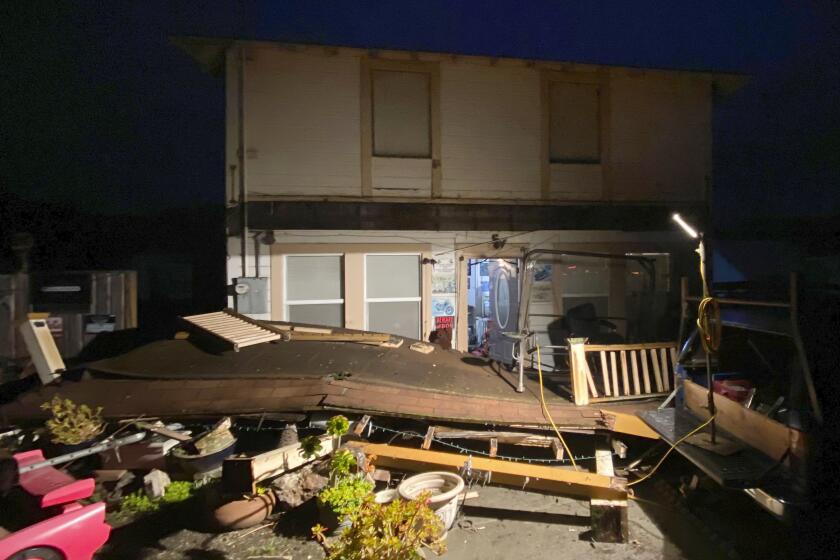It will be a red-tagged Christmas for those whose homes were wrecked in 6.4 quake
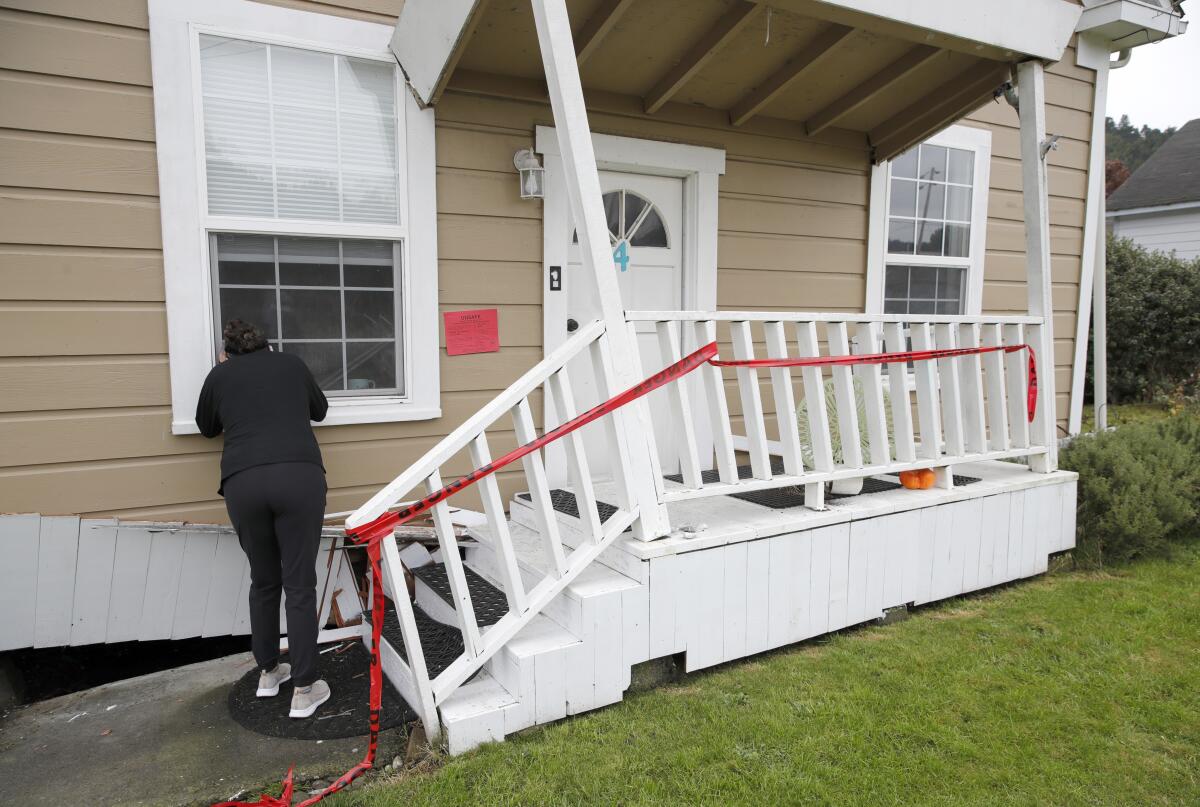
- Share via
RIO DELL, Calif. — As aftershocks rumbled and crews worked across Humboldt County on Wednesday afternoon to restore water and power knocked out by the powerful earthquake that struck earlier this week, Kevin Mcniece rushed to his former home, hoping to beat a code enforcement team so he could grab some of his possessions before access was blocked.
He was too late. The quake-battered structure had already been red-tagged by the time Mcniece, 37, a sawmill machinist, arrived to try to salvage some of his belongings, including his beloved record collection, worth thousands of dollars
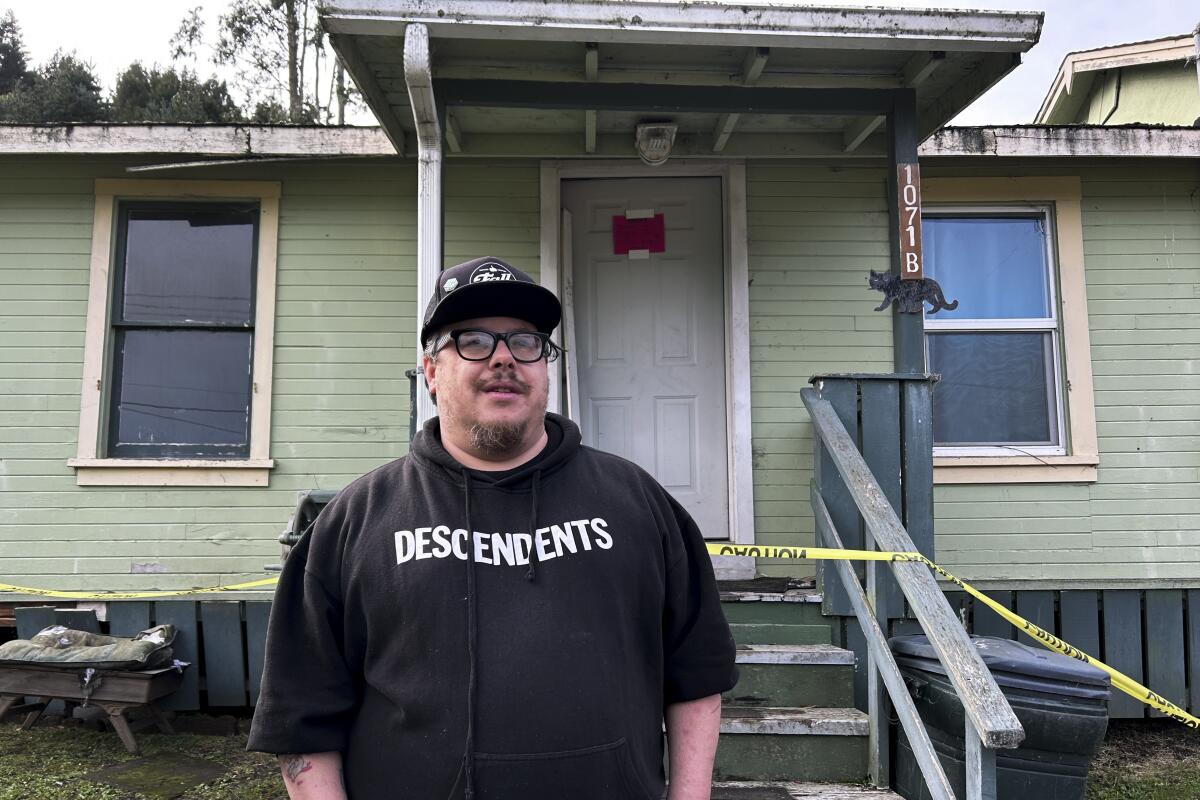
He could only peer helplessly through what used to be his kitchen window at the damage: cupboards blown open, fire retardant stains on the ceiling and shattered glass everywhere.
The house had fallen off its stilts and cracked into three separate pieces. A fire had broken out in the kitchen; water started spewing. He and his cat, Gamora, had scrambled to safety. But now what?
One day after a 6.4 earthquake rocked these rural, redwood-canopied towns, leaving two dead and at least 17 injured, it was clear that Mcniece’s community of Rio Dell, a lumber town built upon the cliffs of the Eel River, had taken the brunt of the damage.
“I became homeless in about 20 seconds,” said Mcniece.
It was a blow this community of 3,400 could scarcely afford. Already battered by the decades-long decline in the lumber industry, nearly three quarters of the children in the school district qualify for free or reduced-price lunch.
A 6.4 earthquake near Ferndale has resulted in at least two deaths from medical emergencies, 11 injuries and extensive damage.
And now there are dozens of red-tagged structures and numerous residents made homeless just days before Christmas. The total cost of the damage has not yet been determined, officials said. Most of the town is under a boil water order, assuming water comes out of their taps at all. “So many leaks,” said Mayor Debra Garnes, of her town’s fractured water system.
“We had a ham and everything,” Rio Dell resident John Ireland said of his plans for cooking Christmas dinner for his mother, 72-year-old Anita Ireland. “And now we might be on the street.”
Ireland, his mother and her pet pit bull, Sarah, have been living out of her 2007 Toyota Camry since the quake jolted them awake in the early dark hours of Tuesday. They later learned their Rio Dell house had also been tagged as unsafe.
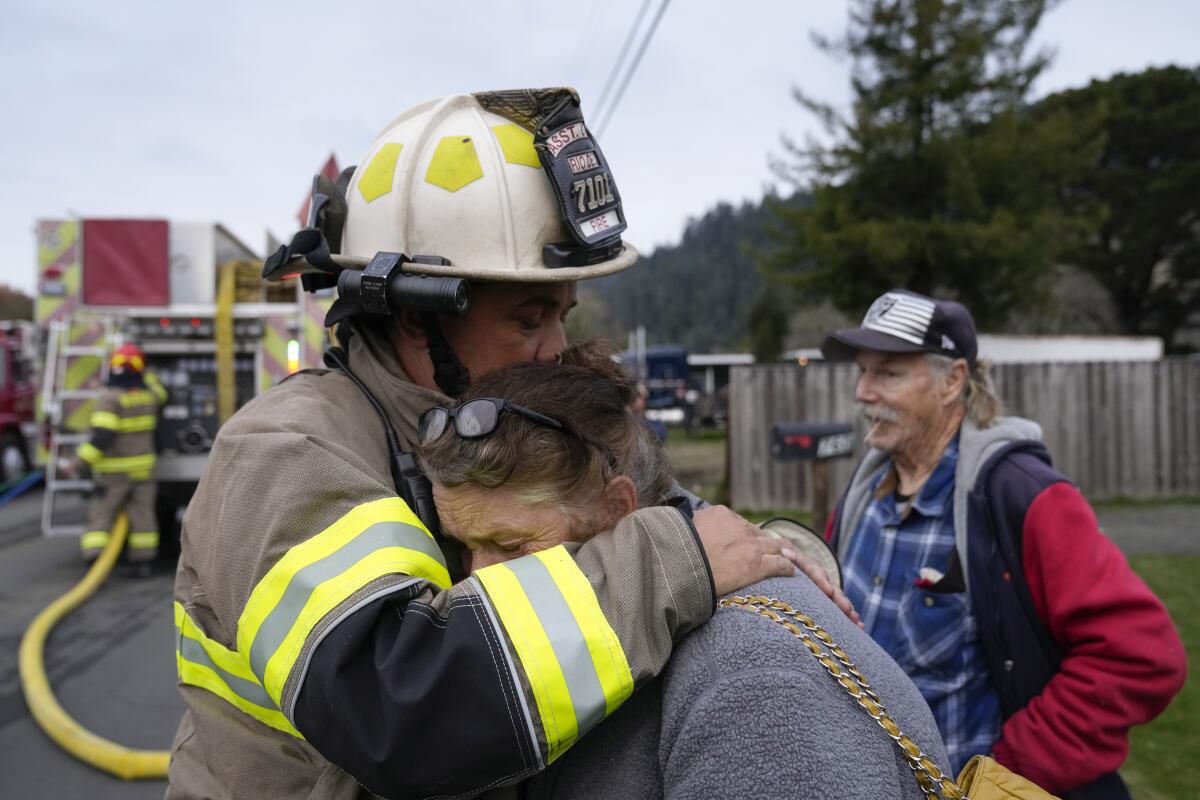
“I grabbed my meds and my blanket, that’s pretty much it,” Anita Ireland said. “We slept in a parking lot last night and probably will tonight, and until some help comes.”
The quake struck at 2:34 a.m., its epicenter just offshore. It ruptured along a fault onshore and traveled northeast up through the old timber towns south of the county seat of Eureka, a place of dense forests, cool mists and battered local economies. It is a place so remote from the rest of California that many residents jokingly describe themselves as living on an island. The region is also accustomed to earthquakes: Tsunami warning signs are posted at jarringly regular intervals along local streets and most residents shrug off smaller temblors. But this quake, many residents said, felt louder, longer and noisier.
Many emerged Wednesday full of trepidation. But the precariousness of a natural disaster revealed itself in the vastly different effect it had on residents in towns just minutes apart. For some, it resulted in homelessness; for others, just a few broken dishes. Outside of Rio Dell, many found themselves surprised and relieved to discover the damage was not as bad as they feared.
Across the Eel River from Rio Dell, the community of Scotia, which has fewer than 1,000 residents, appeared largely unscathed. Most of the historic, early 1900s buildings that line the main street looked intact. Just a couple of broken glass windowpanes marred the Southern Trinity Health Services Building on B Street — an old Victorian-era hospital that sits on a hill overlooking the local sawmill and Eel River.
Power was restored to the town on Wednesday afternoon, although the sawmill was still down. A few workers strode about the yards and the facilities. John Andersen, director of forest policy for the Humboldt and Mendocino Redwood Co., said it is one of the largest employers in the region — with about 200 mill operators, loggers, biologists, geologists and engineers at the sawmill in Scotia. The employees are all hourly.
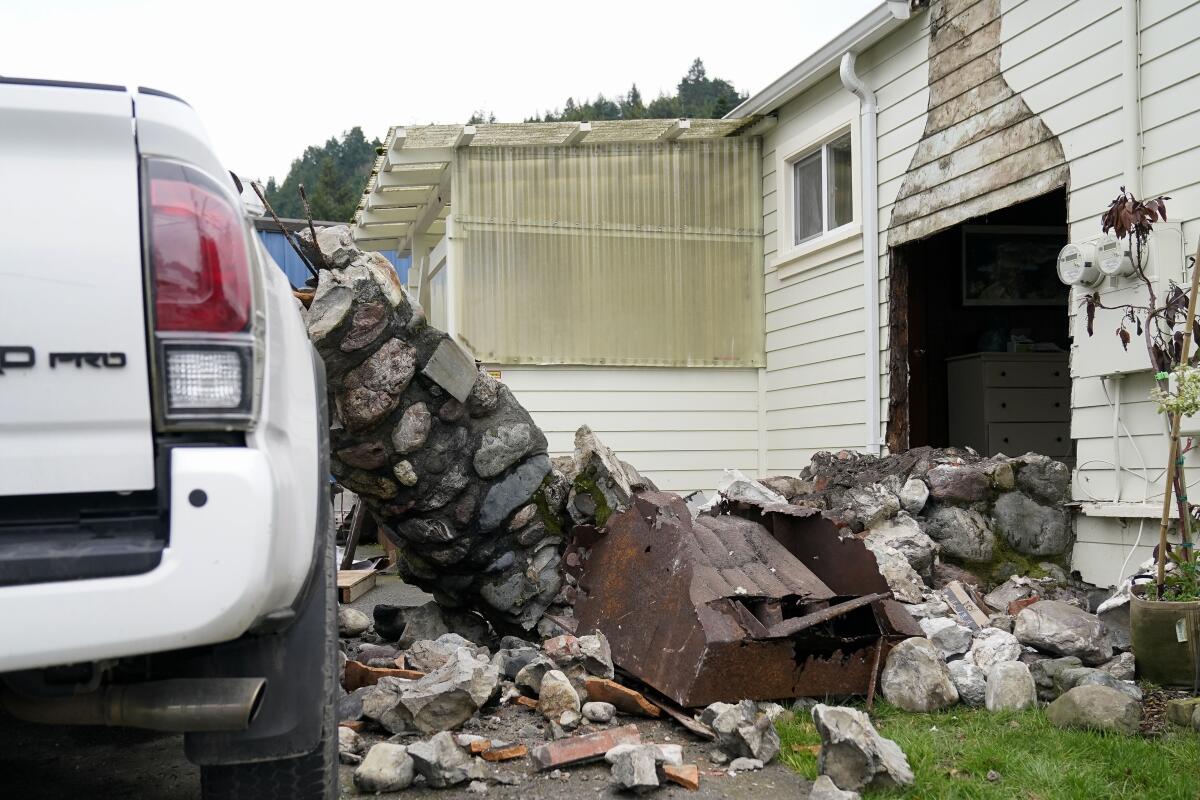
Andersen said employees at the lumber company had gone to Costco in Ukiah the day before and grabbed as much water as they could. They brought it back to the firehouse in Rio Dell. With power out in the community, residents had no access to drinking water.
“I suspect in the coming days and weeks we’ll likely help support these towns by possibly contributing lumber” or creating matching funds to help the town rebuild. He said the timber company is determined to help these communities stave off the encroachment of “rural blight.”
‘It was the most intense earthquake that I’ve felt,’ said the mayor of Rio Dell, Calif., which along with Ferndale took the brunt of the quake.
Despite the magnitude of the quake, elsewhere in the county, life was snapping back to routine.
In Ferndale, a Victorian town of 1,300 that is highly dependent on tourism, some had worried that lack of power and the closure of Fernbridge, which was built across the Eel River in 1911 to connect Ferndale to U.S. 101, might deal a devastating blow during the critical holiday season.
Earthquakes
More resources
— One of the most important things you can do to prepare for an earthquake is talk to your neighbors, writes seismologist Lucy Jones.
— Thinking of buying a premade earthquake kit? We unboxed four of them, from $30 to $300.
— If all you have to eat in your emergency kit are granola bars and canned tuna, here’s how to up your game. Plus here’s some advice from L.A. food people.
— How does California’s earthquake early-warning system work? And what apps should you have on your phone?
But the landmark bridge was reopened by Wednesday afternoon. The power was also back on and illuminating strings of holiday lights.
Caroline Titus, who published and edited the Ferndale Enterprise until she sold it last year and who also owns two Airbnb rentals, said she heard from guests due in for Christmas and New Year’s that they were still coming.
“We’re completely back to normal,” she said Wednesday afternoon. She said just a few windows in town had broken.
Titus said she wasn’t surprised that Ferndale had rebounded so quickly: In a region accustomed to seismic activity, she said all the town’s buildings have been retrofitted. A 6.2 earthquake struck exactly one year ago.
If she had to live through earthquakes, she said, “I’d much rather be here where nothing is going to fall on you” than in a big city elsewhere in California.
Eureka, the biggest city in the region with a population of 26,000, was jolted hard by the quake, with residents jerked awake to tumbling shelves, broken glass and the darkness of an electrical blackout.
The city, once the center of the lumber industry, has grown increasingly reliant on tourism, with cruise ships starting to appear in Humboldt Bay and sending visitors into the streets of its charming Old Town.
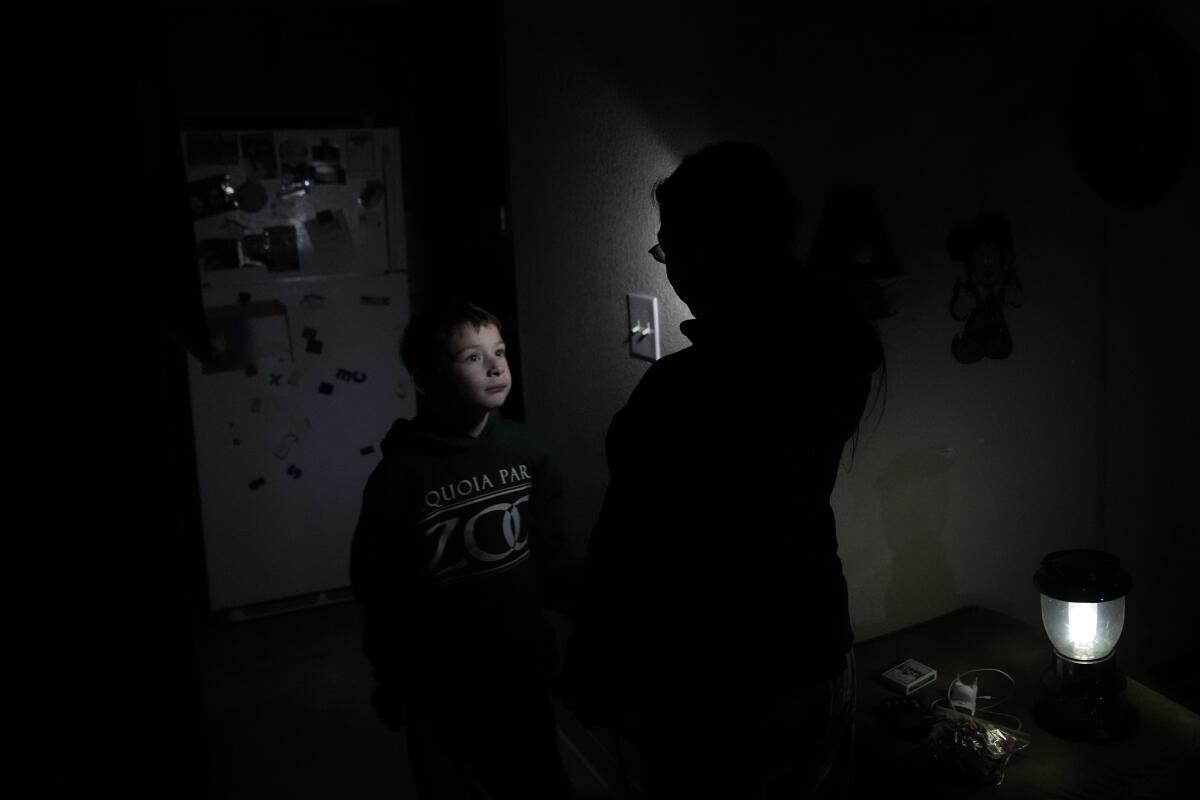
Solstice, a boutique in Old Town that sells artisan wares and food, was back up and running within 24 hours, employee Raelina Krikston said. “Honestly, I was kind of hoping for a three-day Amish vacation,” she said. “But the electricity came back on, so, we’re back too.”
Tourists were back as well, trickling in and out of gift shops, clothing boutiques and cafes. The city’s gloomy wet streets were warmed by Christmas lights and holiday displays.
Cadence Knight, a sales associate at Land of Lovely — a gift shop on 2nd Street — said very little of the merchandise was damaged. The ceramics and glassware that line the shelves had barely moved. “It was the wooden cutting boards that got the worst of it,” she said.
Up the hill from Old Town, Padma and Akash Taggarse, visiting from Tucson, Ariz., braved the Sequoia Park Zoo’s Redwood Sky Walk — a suspended foot bridge 100 feet high. “The earthquake hasn’t really slowed us down,” Padma Taggarse said. “We just had a hard time getting coffee yesterday.”
More to Read
Sign up for Essential California
The most important California stories and recommendations in your inbox every morning.
You may occasionally receive promotional content from the Los Angeles Times.
